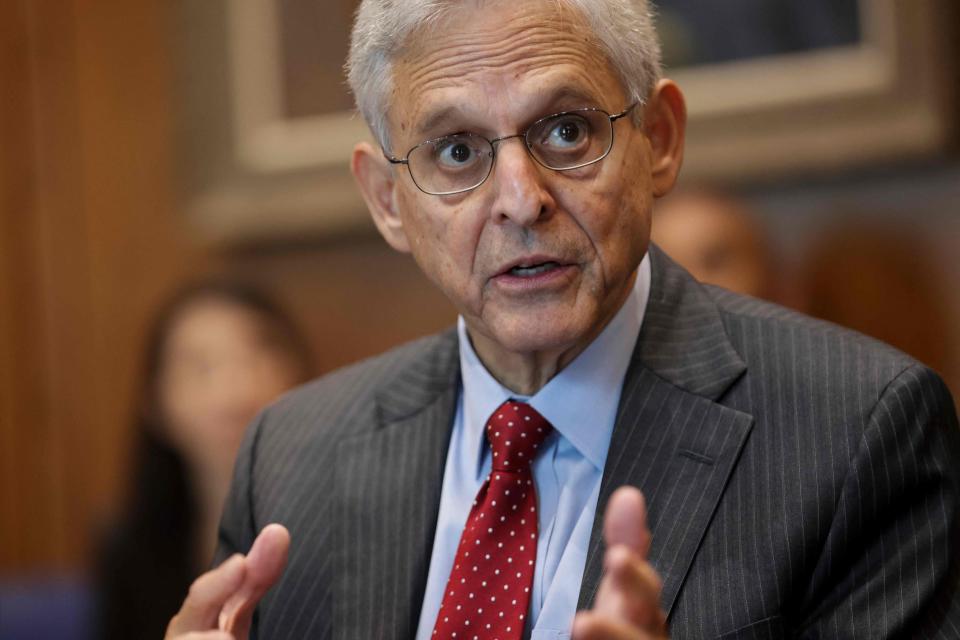Trump search affidavit reveals confidential source documents found at Mar-a-Lago, raising new alarms
- Oops!Something went wrong.Please try again later.
- Oops!Something went wrong.Please try again later.
An initial examination of 15 boxes of documents retrieved from Donald Trump’s Mar-a-Lago estate earlier this year yielded a startling discovery that is now raising new alarms throughout the U.S. intelligence community.
Among nearly 200 “unique documents bearing classified markings,” FBI agents found records marked as "HCS" – a reference to clandestine human sources and some of the most guarded information in the government's intelligence arsenal, according to a newly-unsealed affidavit supporting this month's unprecedented search of Trump's Florida property.
The information, usually locked away in highly secure government facilities, instead was found, along with other "unfoldered" classified material, mixed among Trump's personal property at the former president's beach resort. It's presence at Mar-a-Lago potentially endangered crucial sources of information or risked government secrets falling into the wrong hands, experts say.
Human source information is so guarded because it often indicates the material came from a person recruited by American intelligence who is typically a foreigner, frequently someone who has access to the foreign government’s intelligence, their classified information, their leadership, defense secrets and the like, said Jamil Jaffer, who worked in the White House counsel’s office under President George W. Bush and helped send highly classified documents to the National Archives and Records Administration as part of the administration’s transition.
Mar-a-Lago search affidavit released: Unsecured storage, confidential documents: What Trump search affidavit reveals: live updates

"You are talking about people's lives being at stake," said former federal prosecutor Sarah Krissoff, adding that the discovery appears to have helped propel a deepening criminal investigation into obstruction and possible violations of the Espionage Act.
The explosive contents of the heavily-redacted affidavit also prompted a new call from Senate Intelligence Committee Chairman Mark Warner, D-Va., for a national security damage assessment.
“It appears, based on the affidavit unsealed this morning, that among the improperly handled documents at Mar-a-Lago were some of our most sensitive intelligence – which is one reason the Senate Intelligence Committee has requested, on a bipartisan basis, a damage assessment of any national security threat posed by the mishandling of this information," said Warner, whose statement referred to the discovery of human source information.
“The Department of Justice investigation must be allowed to proceed without interference.”
Read the affidavit: Read the (redacted) affidavit that supported the search of Trump's Mar-a-Lago resort
Trump, in a statement following the affidavit's release, did not explain why he kept such sensitive information, focusing instead on the extensive redactions and the absence of specific references to nuclear weapons information.
Following the Mar-a-Lago search, The Washington Post reported that documents related to nuclear weapons were among the items investigators were seeking.
Andrew Weissmann, a former federal prosecutor who served on special counsel Robert Mueller's team during the investigation into Russia' interference in the 2016 election, described human intelligence as "the lifeblood of many intelligence investigations."
"It is highly sensitive information," Weissmann said. "It means people who are cooperating with national intelligence agents or law enforcement. If that information were leaked or publicly disclosed, it could lead to physical danger or retaliation against the cooperators."
Exposure of such information, Weissmann said, could require the government to move those sources out of potential harm's way.
Will Trump aides be charged?: Trump aides unlikely to face charges on their own in Mar-a-Lago probe, former prosecutors say
Jim Trainor, a former FBI counterintelligence agent who served as assistant director for the cyber division, said the consequences of such sensitive disclosures can have “generational implications.”
Trainor noted two dramatic examples of such compromises in the cases of former FBI double agent Robert Hanssen and ex-CIA officer turned KGB double agent Aldrich Ames, who provided crucial human intelligence that blew the covers of KGB agents working secretly for the U.S., which resulted in some being executed.
“The consequences of the potential disclosure of this information is the cost of getting these sources ... the potential loss of life of the source if disclosed and the loss of intelligence that may or may not ever be acquired again,” Trainor said. “And that puts every human being’s life at risk in the country.”
Trainor added that the revelation of a former U.S. head of state handling classified documents in such a way may also inhibit intelligence information sharing agreements the U.S. has had in place since World War II with its so-called “five eye” allied partners, including the United Kingdom, Canada, New Zealand, Australia, who may no be worried that their sources and methods have been compromised.
Mixed in with the records marked as human source intelligence were other documents designated as "NDI" or national defense information. Because of the heavy redactions, it was not clear whether authorities determined whether the two categories were related in some way.
But the presence of such information clearly put federal investigators on notice that other information likely remained at risk on the Mar-a-Lago property, requiring the Aug. 8 search.
“There is also probable cause to believe that evidence of obstruction will be found at the (Florida) PREMISES," the affidavit stated.
In a separate document unsealed Friday, in which Justice officials made their case for redacting the affidavit, investigators also raised the potential risk to witnesses who have been cooperating with government's investigation.
“First and foremost, the government must protect the identity of witnesses at this stage of the investigation to ensure their safety,” Justice officials wrote. “As this Court noted, if information relating to witnesses were disclosed, 'it is likely that even witnesses who are not expressly named in the Affidavit would be quickly and broadly identified over social media and other communication channels, which could lead to them being harassed and intimidated.'"
The Jan. 6 investigation: Federal prosecutors questioning witnesses about Trump's conduct related to Jan. 6 inquiry

Justice officials not only expressed concern for witnesses and the course of the investigation, but also for the safety of federal law enforcement agents.
“FBI agents who have been publicly identified in connection with this investigation have received repeated threats of violence from members of the public,” the Justice document said. “Exposure of witnesses' identities would likely erode their trust in the government's investigation, and it would almost certainly chill other potential witnesses from coming forward in this investigation and others.”
Yet, it was the affidavit's chilling references to the volume, sensitivity and lack of security surrounding the material recovered at Mar-a-Lago that appeared to stand out from the otherwise blacked out pages, especially records related to human sources.
Jaffer, who also worked on these issues at the Justice Department’s National Security Division, noted that in the years since Edward Snowden, a former contractor for the National Security Agency who leaked information on the nation's most secretive spy agencies and their programs, there have been general concerns about whether foreign assets could trust the American intelligence community, which has contributed to difficulty in recruiting human sources.
Trump served subpoena in June: Trump served subpoena at Mar-a-Lago home 2 months before FBI search
Revealing, leaking or otherwise disseminating human intelligence contained in classified documents "might reveal the identities of sources" who are cooperating with U.S. investigators, said Kenneth Gray, a retired FBI special agent who's now a senior lecturer in the University of New Haven's Department of Criminal Justice.
If human intelligence is publicly revealed from a document classified as top secret, that "could cause grave damage to national security," he added. It could also endanger the cooperators.
"That's the reason for the the classification. You don't want to jeopardize the people who provided information," said Gray. However, he said it's not clear from the redacted affidavit whether any human intelligence information had been leaked. "Who knows if anyone had access to that material" at Mar-a-Largo? said Gray.
What Trump said vs. what we know: Trump's relentless attacks on Mar-a-Lago search lack context. What he said vs. what we know.
This article originally appeared on USA TODAY: Trump search affidavit reveals human source docs. found at Mar-a-Lago

